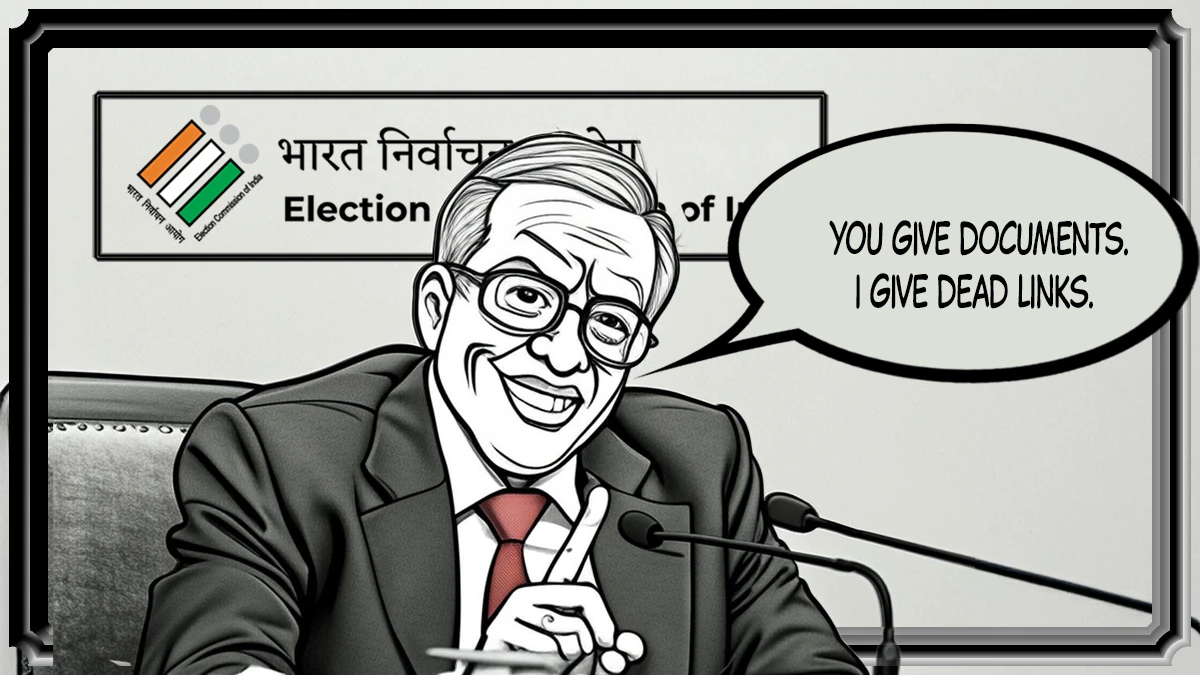
Under the Right to Information (RTI) Act, we requested the Election Commission of India (ECI) to disclose all records, files, notes, and correspondence related to the Special Intensive Revision (SIR) it ordered, first in Bihar and subsequently across the country.
Every Indian citizen is entitled to access these records. The RTI Act mandates that the government and the ECI proactively disclose such information without requiring a formal request rather than obscure it.
The ECI, a constitutional body, directed nearly 8 crore Bihar voters to provide documentary proof of their citizenship and voting rights within 30 days. Ironically, the RTI Act requires the ECI to provide requested documents to citizens within the same timeframe. However, in response to our RTI application, the ECI provided a weblink to a back-end page on its website, which cannot be publicly accessed. These, ECI claimed, were “comprehensive instructions” dated July 14, 2025, which were self-explanatory, but we could not access them.
We specifically asked the ECI to provide the names and numbers of files containing discussions and deliberations that led to the SIR orders in June and July 2025. The ECI failed to acknowledge the existence of such files and records, despite being legally obligated to maintain them meticulously. Under the RTI Act, withholding these records from citizens or destroying them is illegal.
To date, we have documented at least four instances of the ECI refusing to disclose details about the SIR, including two responses to our RTI applications and two to transparency activist Anjali Bhardwaj, who has also been stonewalled by the ECI.
At The Collective, our experience with official documents confirms that no government order, including the SIR, is issued without a recorded paper trail. The ECI’s internal departments would have generated correspondence, file notings, and discussions to develop the SIR and its guidelines. Even if the Chief Election Commissioner and colleagues issued the SIR order spontaneously, subsequent records would have been created to operationalise it.
In our RTI application, filed shortly after the ECI announced the SIR starting in Bihar, we requested complete files related to the SIR, including internal and external correspondence, file notings, discussions, meeting minutes, presentations, and drafts. We also sought a list of file names recording the SIR announced on June 24, 2025. These are not publicly available documents but internal ECI records, which the RTI Act obligates the ECI to share unless specific exemptions apply. Instead of providing justifications for non-disclosure, the ECI supplied a link to a webpage that we cannot see.
We tried to search the ECI’s instructions page for the July 14, 2025, document referred by ECI but found no reference to the alleged “comprehensive instructions,” which the ECI claimed were self-explanatory.
Previously, we reported on the Union Ministry of Law and Justice’s implausible response to another RTI request about the SIR. We asked whether the ECI had sought the Ministry’s legal opinion and, if so, to share the complete paper trail, including files, correspondence, memos, notes, and presentations. The Ministry claimed it would not have kept records of such consultations and transferred the request to the ECI. We established in our prior report that the Ministry’s response was misleading, and we appealed it while awaiting the ECI’s reply.
On August 20, 2025, the ECI responded, stating it had no information available. If accurate, this suggests the SIR proceeded without legal consultation, despite significant political challenges following its announcement.
RTI activist Anjali Bhardwaj also sought ECI records, requesting an independent study justifying the SIR and the complete files related to it. The ECI directed her to its June 24, 2025, announcement, claiming it was self-explanatory and that “no further information is available.” This response indicates the ECI conducted no independent study for the SIR and is unwilling to disclose its internal decision-making process. Bhardwaj also requested the 2003 SIR order, the last time such a revision occurred, but the ECI refused to provide it, again referring her to the 2025 announcement.
The Reporters’ Collective has extensively covered the SIR exercise. Our initial report revealed that the ECI’s internal health metrics for Bihar’s voter rolls showed no anomalies warranting an immediate overhaul. We also highlighted issues with the SIR’s draft electoral rolls in Bihar, which contain duplicates and dubious house addresses, indicating the exercise is not delivering the intended results.
While the ECI demands complete accountability from citizens to produce records to validate their existence, voting rights, and citizenship, it refuses basic transparency itself under the RTI Act. We will not relent. Under the law, we will appeal to obtain the information that is our right. We will continue to investigate and report on the issue. Watch this space.
The tax authorities have revoked our non-profit status claiming our journalism does not benefit the society. The order has severely choked the funds we need to carry out investigative journalism.
If you believe the government and the powerful in the country need to be held accountable to citizens. If you believe our journalism does so, please donate to keep the Collective alive. Now more than ever we need your support.
